As soon as I heard about Digital Active Women I got excited to have the opportunity to understand, why a digitally active woman like me finds it unnecessarily hard to understand the system or to get things done online.
After three years of participating in this project I realised that although it seemed like everything is available online, the majority of services offered by governmental and public agencies are still very dependent on the human factor. A typical appointment with a very typical Beamter, who will get things done and in order to reach him, you will have to go through a website overloaded with pages full of information one after another or chain of employers on the phone, if you have the language ability to conduct such conversations over the phone, only to find a monolingual public sector employee with very limited time slots available and no language to communicate with.
A solid example to demonstrate is Agentur für Arbeit. With very little German knowledge it took me a while to be able to understand the double verification of registration in both online and offline forms (in the form of a letter I receive full of instructions written in German on a paper to complete my registration process). If offline authentication is a must for security reasons, then it would be highly important, if there was an option for the new immigrant to send the letter in 2-3 languages besides German, or, what would be helpful as well, a digital form of this letter to translate it through translating engine like deepL or google translate.
While trying to navigate the website to find a way for Wiedereinstieg into the IT Branch after more than ten years of staying at home, I had to load one page after another in form of texts and hyperlinks explaining the definitions of terms and offering no solid solutions. Every attempt to find a way to a training opportunity in a company through the Agentur für Arbeit search engines using keywords like Daten, Analyse, Trainingsprogramm with the intention to integrate women/immigrants led me to either courses or Duales Studium, which aren’t suitable for my case.
The structure of the website that doesn’t take into consideration that, as an immigrant with limited German knowledge and very limited understanding of the logic of German bureaucracy, I need to find as much information and offers with solid steps to register with the least human contact possible, as long as the public sector remains monolingual. For years, I found a huge and very resourceful institute like Agentur für Arbeit useless for me. Then, one year, I was finally, language-wise, able to conduct a conversation with a Beraterin, just to convince her that a computer engineer will not find a job through the offers of Bauleiter that she kept sending to me. Finally, she forwarded me, also offline, to a more specialised team who can help me in my field of study.
Participating in Digital Active Women opened a tunnel of networking that remains a crucial factor in understanding the system and getting things done. Networks are a privilege many immigrants are deprived from, living in social isolation because of the nature of the German society and the language barrier. From my perspective, the purpose of digitalisation and online services is to make information, like the training opportunity I learned about through my new network from Digital Active Women, accessible to everyone, just like it would be through the search engine of the Agentur für Arbeit.
Ich bin Informatikerin mit großem Interesse für die Entwicklung der Gesellschaft. Außerdem bin ich Mutter zweier „Drittkulturkinder“, die mit Neugier von einem Projekt zum anderen in die Welten der digitalen Geisteswissenschaften und Sprachen springt.

11/2023
Digitale Informations- und Beratungsangebote bedarfsgerecht (weiter)entwickeln
